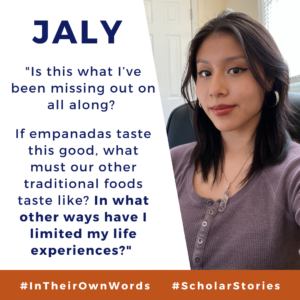LUCA is proud to launch the second #InTheirOwnWords series! Over the next few weeks, we will share personal statement essays written by the Latino U Scholars Class of 2022 so that our Scholars can introduce themselves and share their experiences – in their own words. All essays are shared with the permission of each Scholar. The essay below was written by Jaly, a Latino U Scholar from Ossining High School.
JALY’S PERSONAL STATEMENT ESSAY
I hate the smell of incienso burning as we walk. My feet hurt, my legs are cold, my coat is the size of my entire body. This skirt is hideous and I hate my hair. My head aches as my braids pull at my scalp. Why did my mother make me do this? Why are we walking around the village towards the church? Platillera is such an ugly name; the platillo I must hold is so bulky and almost as big as I am. I’d rather be a florera, like the older girls, and carry pretty roses. Why am I wearing heels when I’m only nine years old? Everyone is staring, laughing, and recording. The music is deafening. All the songs sound the same; why is there a band? Kids from school are joining us in our walk, I hope they don’t see me with my mom. Is no one embarrassed? Every single year they celebrate this event. What are they celebrating and why does it always have to be on a day when it is snowing? Why do Ecuadorians have to eat guinea pigs for this celebration? Gross.
In fifth grade my mother enrolls me in a dual-language program offered by my school district. At first, I am resentful. I’m supposed to be in a class with my friends from last year. Now, I’m learning how to speak and write in Spanish. Nobody laughs at me for stuttering and not being as fluent as they are. We create PowerPoint presentations for Hispanic Heritage Month. I’ve never seen so many kids rush to raise their hands and argue about who will represent Ecuador. For the last week, my classmates decide to bring cultural dishes from their native countries. My parents work full time, so I bring nothing.
My new friend, Jasmine, who is also Ecuadorian, has made empanadas con queso. I grab a napkin and take an empanada that is still warm and crispy. The sprinkled sugar and pinched edges are perfectly done. She brought so many; they take hours to prepare and it is a huge effort not to burn them. I sip my apple juice and carefully take a tiny bite… I’ve never tasted anything so sweet and soft and brings me such delight. I rush and take a larger bite, one after the other. Suddenly, I feel full. I am left in dismay. I ate three empanadas. Is this what I’ve been missing out on all along? If empanadas taste this good, what must our other traditional foods taste like? In what other ways have I limited my life experiences?
In high school, I’m no longer a platillera, I carry the roses now, I am a florera. My new pollera fits perfectly, it is not too long and not so heavy on my waist either. I am now appreciative to have participated in la Fiesta del Divino Niño Jesús throughout my formative years, as it celebrates an important part of my culture as an Ecuadorian woman. The internalized hatred of my culture, which I experienced in childhood no longer influences my perspective of myself and my ethnicity. I’m mindful of my thoughts and welcome my uniqueness as I shift away from idolizing European beauty standards and honor my indigenous long curved nose and wide lips. I try to convey this mindset to those around me who still struggle to see their absolute beauty; the beauty that has been passed down for generations by forebearers who’ve endured tremendous obstacles. I am the eldest daughter of immigrant parents. Although they are no longer able to celebrate their cherished traditions in their homeland, I am grateful that they have taught me to respect my cultural heritage. Now I continue to ask myself, in what other ways can I adequately deepen and restore my connection with my ancestors and my country?

